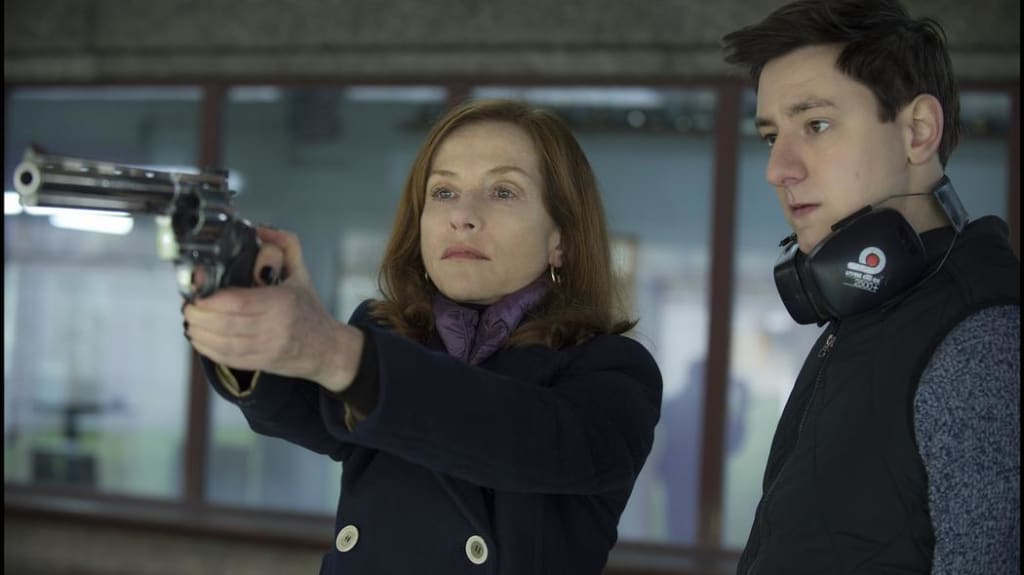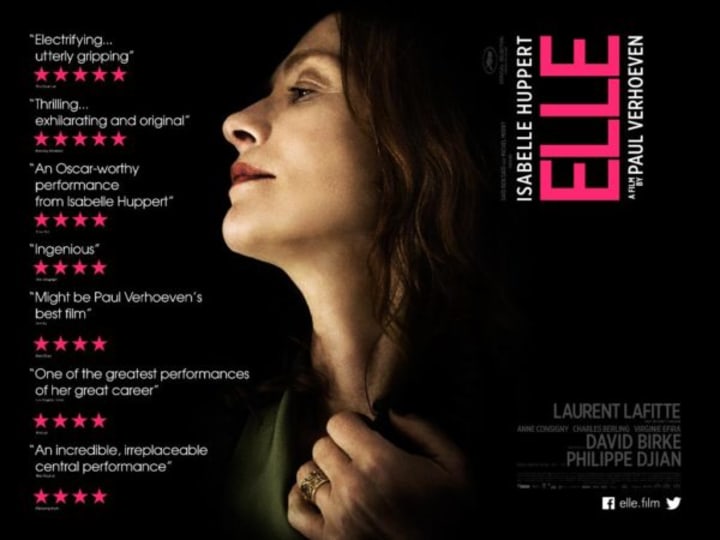Elle (2016) - Review
Pitch black humor, psycho-sexual thrills and ruminations on personal freedom abound in Paul Verhoeven's latest

Dutch provocateur Paul Verhoeven has long been a film-maker I admire; I first saw Robocop (1987) at about 10 years old, having previously only seen family/children's fare, and it kick-started my true love affair with movies. It's outrageous violence and bitingly satirical humour, combined with a surprising humanism in dealing with Murphy's fate, made an unmistakable impression on me. 30 years after Robocop's release and I'm blown away by the maturity and evolution of Verhoeven's style in his latest film, the intoxicating Elle. The black humour is still there, but it's punchlines are now people and their behaviours, not society; the violence is still intense, but more considered and impactful, and a damn sight less gory. Stronger than ever though is the humanism; Verhoeven appears a man that believes in the importance of freewill, of agency, in our lives. You're only truly alive when you own all of your decisions and their consequences.
Elle, based on the novel Oh... by Philippe Divan, opens with the sound of a struggle, and the first images we see are the aftermath of a sexual assault. The victim, software company CEO and divorcee Michele LeBlanc, played fearlessly by Isabelle Huppert, doesn't call the police and it isn't until later that we understand why. She doesn't curl up and cry, or reach out (immediately) to anyone in her life for help and support; she simply tidies the mess in her living room, bathes, and continues on with her day-to-day life. This isn't to say she is not affected; she becomes more cautious in some ways, and has flashbacks that clearly take their toll. Before long, her attacker begins taunting via text and then more invasive methods, and Michele finds her rape recollections becoming table-turning revenge fantasies. She has the locks changed on all her doors and shops for mace and other self defence items. She finally tells her closest friends of her ordeal, casually over a ostensibly celebratory dinner, and expects nor asks anything of them. Michele suspects several of the men in her life, and begins her own investigations, but when the perpetrator tries assaulting her again one night, Michele is able to turn the tables and begins a deadly new game of her own...

Evocative poster art for Elle
Michele is surrounded by men that seek her control, and some she extends it to regardless; her lazy weak-willed son through his finances, her ex-husband by potentially providing him work, her best friends husband though a meaningless sexual affair, conflict causing employees through assertions of her authority. This seems to stem from a complicated relationship with her father, an infamous imprisoned mass murderer, who she has severed contact with; she feels controlled by her fear of him, and her inability to escape it. She channels conflicting feelings on control by appearing to be submissive to her attacker, whilst actually facilitating the encounters herself. Somewhere along the line she begins to reassess these needs, concerned as to where they may lead, and decides to confront her father; mere minutes of being informed of her visit though, he commits suicide. Denied her denouement, Michele realizes the power had been hers all the time, that her father had lived in fear of some day having to explain himself, his terrible actions and their consequences for everyone, to her. With this knowledge, Michele finds means to give control back to the men in her life, whilst at the same time becoming free of theirs or anyone else's.
Photographed in a cool, soft palette, breezily paced, full of smart & funny dialogue and assured performances, Elle tackles it's provocative subject matter with a boldness and dexterity not commonly seen in Hollywood. Talks of an American remake would likely end up sanitized or sensationalized; either way it would underestimate it's audience ability to understand Michele's thoughts, feelings or actions. Verhoeven doesn't do this for a second, even when some of the scenario's lean on believability a little. At the centre of this is Isabelle Huppert's Cesar Award winning performance as Michele, aloof detachment and biting wit belying deeper wounds and internal conflict; even during her most questionable actions, Huppert ensures Michele remains compelling, sympathetic and believable. Don't let is difficult subject matter and strong imagery put you off; Elle is powerful, thought-provoking cinema that needs to be seen, a master director and exceptional actress at their uncompromising best.
About the Creator
James Giles
Writer, confessed geek and pop culture enthusiast, loves film, TV and video games. Blogged and written for various websites on all the above.






Comments
There are no comments for this story
Be the first to respond and start the conversation.